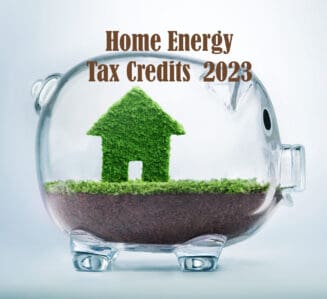
Home Energy Tax Credits 2023
Get tax credits for making energy improvements to your home! Thanks to the Inflation Reduction Act of 2022, the credit amounts and qualifying expenses have been expanded.
Who can benefit from these credits? Anyone who purchases and installs qualifying improvements in their primary residence. But that’s not all! Renters and owners of second homes used as residences can also claim these credits.
Just remember, these credits are only available for improvements made to homes you actually live in. Don’t miss out on the opportunity to save money while making your home more energy efficient.
Energy Efficient Home Improvement Credit
These expenses may qualify if they meet the requirements detailed on energy.gov:
- Exterior doors, windows, skylights, and insulation materials
- Central air conditioners, water heaters, furnaces, boilers, and heat pumps
- Biomass stoves and boilers
- Home energy audits
The amount of the credit you can take is a percentage of the total improvement expenses in the year of installation:
- 2022: 30%, up to a lifetime maximum of $500
- 2023 through 2032: 30%, up to a maximum of $1,200 (water heaters, heat pumps, biomass stoves, and boilers have a separate annual credit limit of $2,000), no lifetime limit
How to Claim Credit for Energy-Efficient Home Improvements
File Form 5695, Residential Energy Credits Part 11, with your tax return. You must claim the credit for the tax year when
the improvement is installed (not purchased).
Residential Clean Energy Credit
These expenses may qualify if they meet the requirements detailed on energy.gov:
- Solar, wind, and geothermal power generation
- Solar water heaters
- Fuel cells
- Battery storage (beginning in 2023)
The amount of the credit you can take is a percentage of the total improvement expenses in the year of installation:
- 2022 to 2032: 30%, no annual maximum or lifetime limit
- 2033: 26%, no annual maximum or lifetime limit
- 2033: 26%, no annual maximum or lifetime limit
- 2034: 22%, no annual maximum or lifetime limit
How to Claim Credit for Residential Clean Energy
File Form 5695, Residential Energy Credits Part I, with your tax return to claim the credit. You must claim the credit for the tax year when
the improvement is installed (not purchased).
See the IRS flyer Click: Home Energy Tax Credits
Back to Blog
